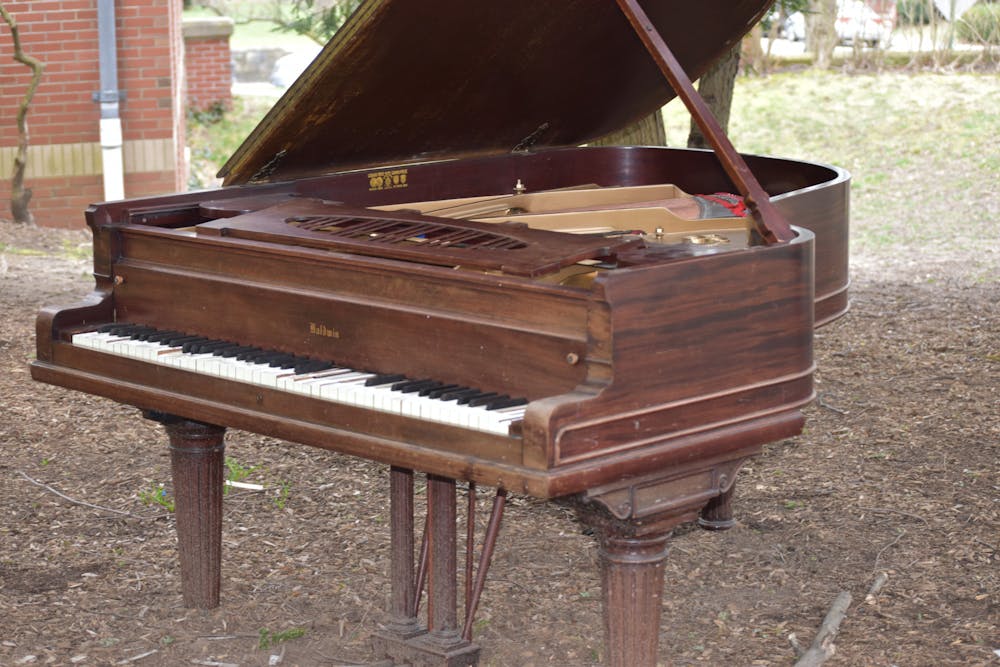Since late February, students passing by the Orwig Music Library have been greeted by a sight familiar to most musicians: a piano. But the instrument on display under the library’s pine trees is no ordinary piano — it’s a decomposing one. This outdoor piano display is the work of Devanney Haruta ’16.5 GS, who titled her project “Piano (de)composition.”
For Haruta, the project challenges the assumption that instruments only hold value in their traditional forms. She hopes that the piano will allow her to better understand the life cycle and construction of instruments, but she also encourages community members to engage with it in any creative capacity they wish.
Haruta, who is pursuing a PhD in musicology and ethnomusicology, first came across the discarded piano after the music department had decided to throw it out. She saw the project as an opportunity to give the instrument “a second chance at life.”
According to Dana Gooley, professor of music and chair of the department, Haruta’s field of study looks to “understand how music participates in the formation of identities, social formations, political ideologies and affective communities.”
Both Haruta’s installation and her personal research are informed by these principles. Haruta said she is particularly interested in the “relationships that people build with instruments.”
The installation was inspired by Ross Bolletor, an Australian composer who places old pianos outdoors for musical performances.
“He calls these instruments ‘ruined pianos.’ He will collect these as donations from families or find them in an abandoned building,” Haruta explained. “He improvises on (the pianos) … without necessarily bringing them into traditional, playable conditions.”
“I wanted to do something similar to that,” she said.
Haruta hopes that the installation “opens up opportunities for reflection on the relationship between sound, material and environment, and our own interactions with and expectations for instruments,” according to her blog, which will track the decomposition of the piano over the upcoming years.
Haruta explained that she is particularly interested in the materiality of the instrument. As the instrument is “slowly breaking down” she has been able to learn more about how the piano was constructed. For example, after a rainstorm, she learned that “the glue holding (the plastic key covers) was water-soluble.”
Following continued material decay, Haruta expects to find changes in the instrument’s sonic behavior. The altered state of the piano allows visitors to experiment with a sound much different from what they might be used to.
The decomposition process “forces you to engage with (the piano) differently ... it's not playable in the same way,” Haruta said. “So I would like people to explore different techniques” and “different sonic possibilities.”
Haruta also looks to study the relationships people build with ruined instruments, particularly through the lens of life and death.
“I think of this piano as having an afterlife,” she explained. “This discourse (around life and death) appears a lot in a formal academic context, but also casual conversations about instruments.”
The installation is also a space for students and the Providence community to interact with the music department, inviting visitors “to play and engage with the piano to observe its changing materials and sound over time,” according to the project’s blog.
“I'm also hoping that people might want to engage with this instrument for different creative projects,” Haruta said. “I would love it to be open as a creative resource.”
Correction: A previous version of this story misstated Devanney Haruta's class year. The Herald regrets the error.

Ryan Doherty is the managing editor of digital content and vice president of The Herald's 135th editorial board. He is a junior from Carmel, NY who is concentrating in chemistry and economics. He previously served as a university news and science & research editor, covering faculty and higher education.





